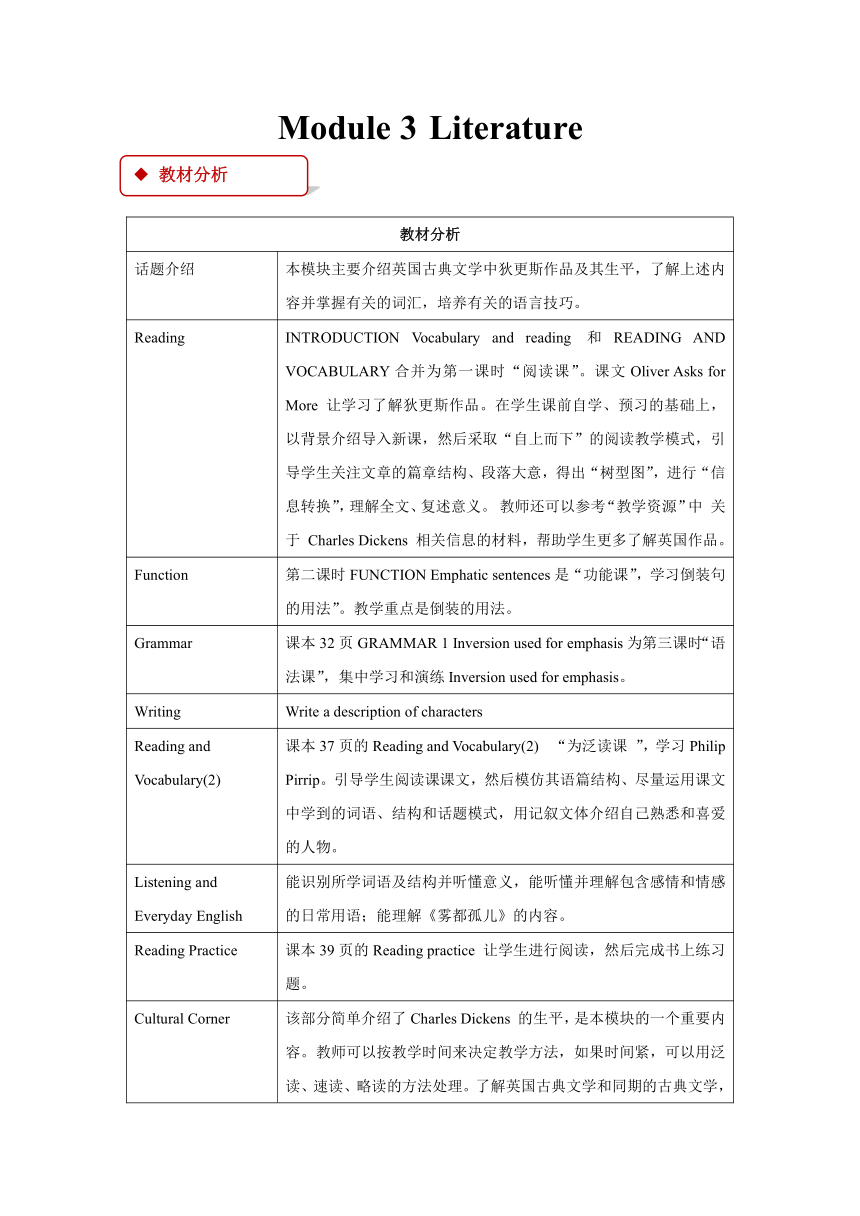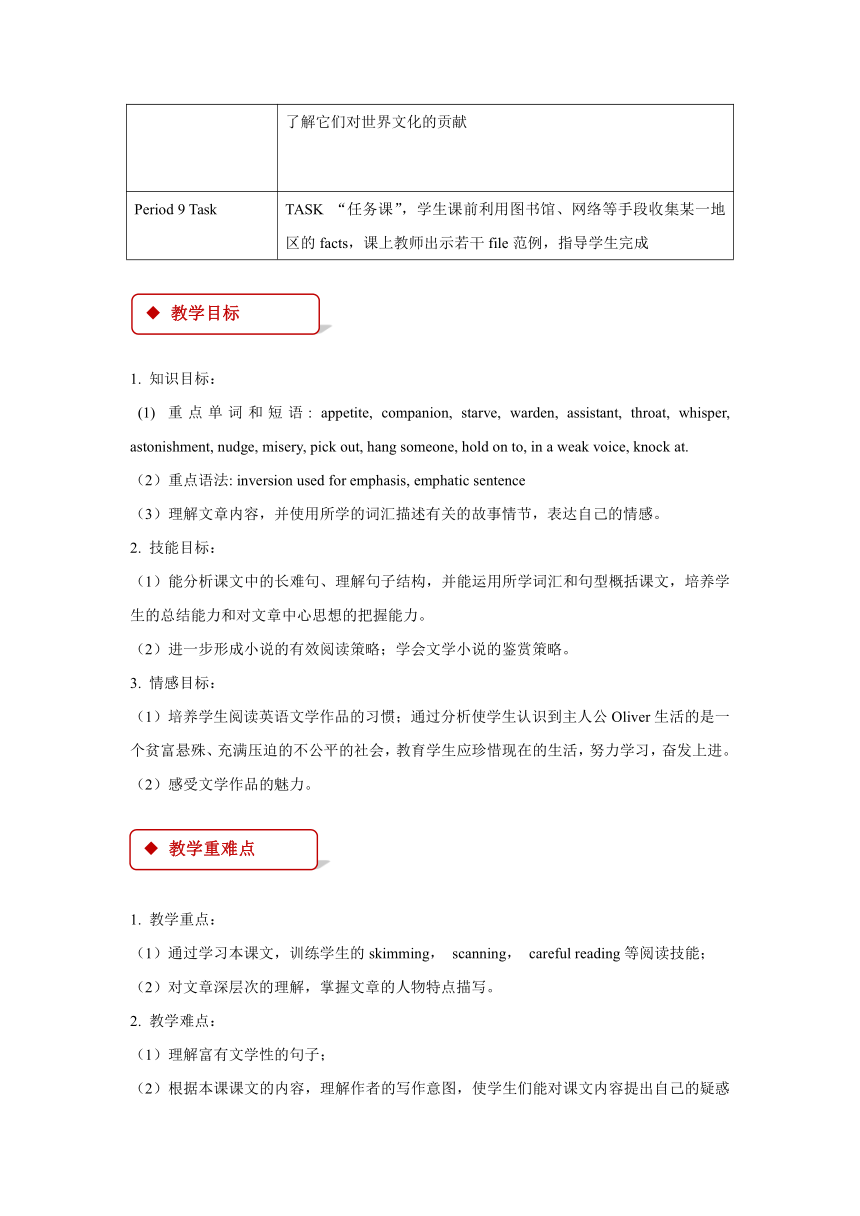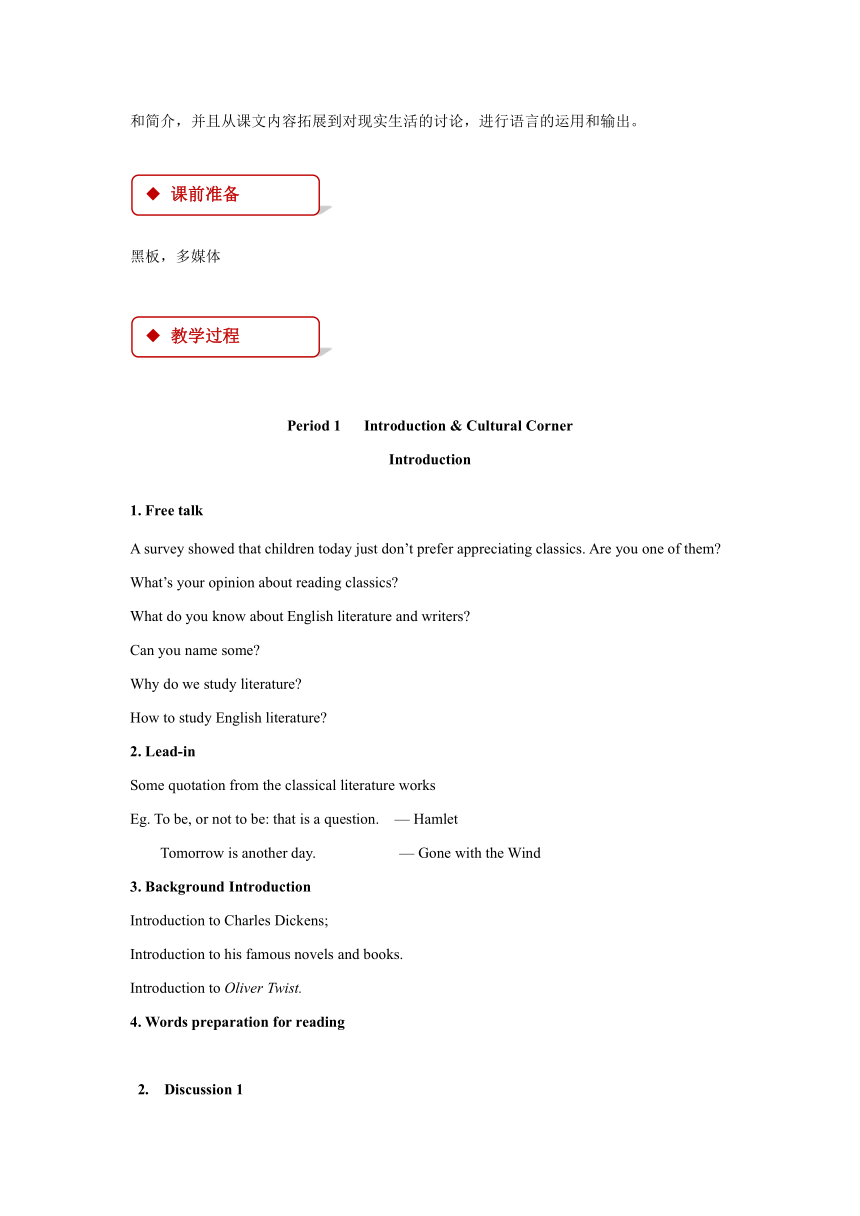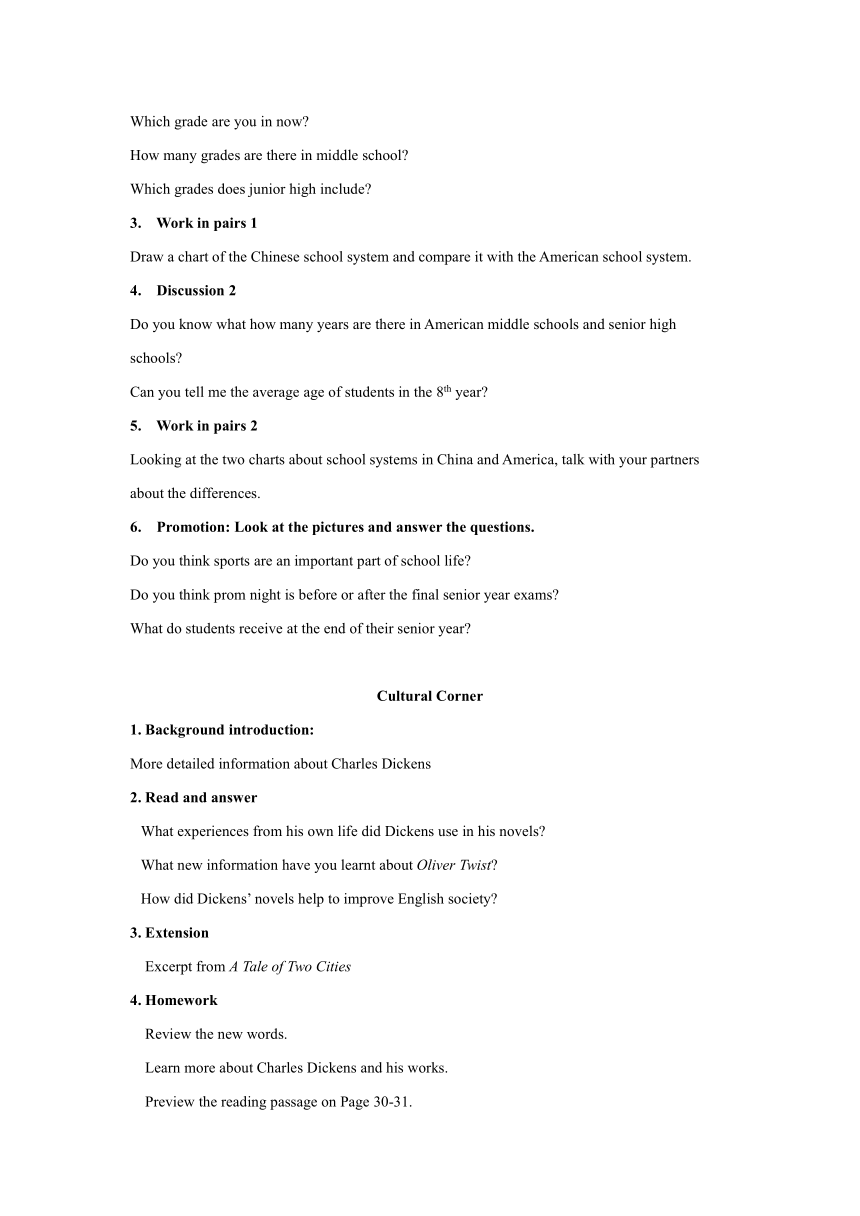选修7 Module 3 Literature 模块教案
文档属性
| 名称 | 选修7 Module 3 Literature 模块教案 |

|
|
| 格式 | zip | ||
| 文件大小 | 26.9KB | ||
| 资源类型 | 教案 | ||
| 版本资源 | 外研版 | ||
| 科目 | 英语 | ||
| 更新时间 | 2019-07-31 00:00:00 | ||
图片预览




文档简介
Module 3 Literature
教材分析
话题介绍
本模块主要介绍英国古典文学中狄更斯作品及其生平,了解上述内容并掌握有关的词汇,培养有关的语言技巧。
Reading
INTRODUCTION Vocabulary and reading 和READING AND VOCABULARY合并为第一课时“阅读课”。课文Oliver Asks for More 让学习了解狄更斯作品。在学生课前自学、预习的基础上,以背景介绍导入新课,然后采取“自上而下”的阅读教学模式,引导学生关注文章的篇章结构、段落大意,得出“树型图”,进行“信息转换”,理解全文、复述意义。 教师还可以参考“教学资源”中 关于 Charles Dickens 相关信息的材料,帮助学生更多了解英国作品。
Function
第二课时FUNCTION Emphatic sentences是“功能课”,学习倒装句的用法”。教学重点是倒装的用法。
Grammar
课本32页GRAMMAR 1 Inversion used for emphasis为第三课时“语法课”,集中学习和演练Inversion used for emphasis。
Writing
Write a description of characters
Reading and Vocabulary(2)
课本37页的Reading and Vocabulary(2) “为泛读课 ”,学习Philip Pirrip。引导学生阅读课课文,然后模仿其语篇结构、尽量运用课文中学到的词语、结构和话题模式,用记叙文体介绍自己熟悉和喜爱的人物。
Listening and Everyday English
能识别所学词语及结构并听懂意义,能听懂并理解包含感情和情感的日常用语;能理解《雾都孤儿》的内容。
Reading Practice
课本39页的Reading practice 让学生进行阅读,然后完成书上练习题。
Cultural Corner
该部分简单介绍了Charles Dickens 的生平,是本模块的一个重要内容。教师可以按教学时间来决定教学方法,如果时间紧,可以用泛读、速读、略读的方法处理。了解英国古典文学和同期的古典文学,了解它们对世界文化的贡献
Period 9 Task
TASK “任务课”,学生课前利用图书馆、网络等手段收集某一地区的facts,课上教师出示若干file范例,指导学生完成
1. 知识目标:
(1) 重点单词和短语: appetite, companion, starve, warden, assistant, throat, whisper, astonishment, nudge, misery, pick out, hang someone, hold on to, in a weak voice, knock at.
(2)重点语法: inversion used for emphasis, emphatic sentence
(3)理解文章内容,并使用所学的词汇描述有关的故事情节,表达自己的情感。
2. 技能目标:
(1)能分析课文中的长难句、理解句子结构,并能运用所学词汇和句型概括课文,培养学生的总结能力和对文章中心思想的把握能力。
(2)进一步形成小说的有效阅读策略;学会文学小说的鉴赏策略。
3. 情感目标:
(1)培养学生阅读英语文学作品的习惯;通过分析使学生认识到主人公Oliver生活的是一个贫富悬殊、充满压迫的不公平的社会,教育学生应珍惜现在的生活,努力学习,奋发上进。
(2)感受文学作品的魅力。
1. 教学重点:
(1)通过学习本课文,训练学生的skimming, scanning, careful reading等阅读技能;
(2)对文章深层次的理解,掌握文章的人物特点描写。
2. 教学难点:
(1)理解富有文学性的句子;
(2)根据本课课文的内容,理解作者的写作意图,使学生们能对课文内容提出自己的疑惑和简介,并且从课文内容拓展到对现实生活的讨论,进行语言的运用和输出。
黑板,多媒体
Period 1 Introduction & Cultural Corner
Introduction
1. Free talk
A survey showed that children today just don’t prefer appreciating classics. Are you one of them?
What’s your opinion about reading classics?
What do you know about English literature and writers?
Can you name some?
Why do we study literature?
How to study English literature?
2. Lead-in
Some quotation from the classical literature works
Eg. To be, or not to be: that is a question. — Hamlet
Tomorrow is another day. — Gone with the Wind
3. Background Introduction
Introduction to Charles Dickens;
Introduction to his famous novels and books.
Introduction to Oliver Twist.
4. Words preparation for reading
2. Discussion 1
Which grade are you in now?
How many grades are there in middle school?
Which grades does junior high include?
3. Work in pairs 1
Draw a chart of the Chinese school system and compare it with the American school system.
4. Discussion 2
Do you know what how many years are there in American middle schools and senior high schools?
Can you tell me the average age of students in the 8th year?
5. Work in pairs 2
Looking at the two charts about school systems in China and America, talk with your partners about the differences.
6. Promotion: Look at the pictures and answer the questions.
Do you think sports are an important part of school life?
Do you think prom night is before or after the final senior year exams?
What do students receive at the end of their senior year?
Cultural Corner
1. Background introduction:
More detailed information about Charles Dickens
2. Read and answer
What experiences from his own life did Dickens use in his novels?
What new information have you learnt about Oliver Twist?
How did Dickens’ novels help to improve English society?
3. Extension
Excerpt from A Tale of Two Cities
4. Homework
Review the new words.
Learn more about Charles Dickens and his works.
Preview the reading passage on Page 30-31.
Period 2 Reading and vocabulary 1 & Speaking 1
Reading and vocabulary 1
1. Lead-in:Video time
Excerpt from the movie Oliver Twist.
Play the audio about the passage Oliver Ask for More.
2. Fast reading
Read the passage quickly and summarize the main idea.
Read and repeat the words in the box, then guess their meanings before completing the sentences.
Complete the sentences with the correct form of the words in the box.
3. Careful reading
Read the passage again to complete the sentences.
Eg. On special holidays the boys were allowed to eat
Discuss: What’s the writing purpose of the story?
Speaking 1
1. Work in groups.
Answer the questions about the reading passage.
How would you feel in such a similar situation?
Would you have asked for more? Why / Why not?
2. Role-play
Work in groups of five and choose a character to play.
Character One: Oliver Twist
Character Two: Mr. Bumble
Character Three: the warden
Character Four: Mr. Limbkins
Character Five: the gentleman in a white jacket
3. Homework
Review the whole text and find out the main words and phrases in the text.
Practice acting out the scene in groups.
Period 3 Vocabulary and listening & Speaking (2)
1. Pre-listening
Read the sentences and guess the meaning of the italicized parts.
Eg.A young woman suddenly screamed, “Oh my dear brother!” 尖叫
2. Pre – listening 2
Work in pairs and discuss the questions with your partner.
1. Is the neighbourhood safe?
2. Why don’t people try to help Oliver?
3. Where does the man take Oliver?
3. While listening
Listen to the passage. Check if you guessed correctly and answer the questions.
1. What is Oliver carrying at the beginning of the passage?
2. Why does the young woman describe Oliver as naughty?
3. What does Oliver say about the young woman, and the man who is dragging him away?
4. When Oliver sees the young woman’s face, why is he astonished?
5. What does the man with the dog say about the books?
6. Who or what is Oliver most frightened of?
4. After sentences
Do Exercise on Page 34
Speaking (2)
1. Discussion 1
Work in small groups. Discuss the question by using the words below.
Question:How did you feel after listening to the passage? Try and explain your feelings.
2. Discussion 2
Work in small groups. Discuss the question:
Do you think the scene was amusing? If so, which parts were amusing?
3. Discussion 3
Work in small groups. Discuss the question:
What do you think happened to Oliver after he left the workhouse?
4. Homework
Finish Tasks 11-14 in workbook, Module 3.
Preview the reading passage for next period.
Period 5 Reading and vocabulary 2 & Reading practice
Reading and vocabulary 2
1. Warm-up
How much do you know about the books written by Charles Dickens?
Are you familiar with the screens (see PPT )?
Are you familiar with Great Expectation?
2. Fast reading
Read the passage and say who sent money to Pip secretly.
3. Careful reading
Read the passage again. Answer the questions.
1. What are the great surprises in Pip’s life?
2. What is the great surprise in Estella’s life?
3. How does Pip and Estella’s relationship change?
4. Writing
Write a short description of these characters in Great Expectations.
Work in pairs or in small groups. Rewrite the last two paragraphs of the story, changing the story and giving it a different ending.
Reading practice
1. Word list
distribute filthy choke starvation accumulate accomplish pedestrian
2. Reading
Read the passage and discuss the main idea of it with your partner.
3. Discussion
What is the text type of this passage?
How many parts can the passage be divided into?
4. Practice
Finish Activity 5&6 on page 40
5. Homework
Finish the writing description.
Finish reading practice on Page 39-40.
Finish Task 8-10 in workbook, Module 3.
Write a description of your hometown or a nearest big city. Describe what it was like in the past and what it is like nowadays.
Period 6 Grammar
Inversion used for emphasis
1. Grammar Introduction
Inversion used for emphasis 倒装句
2. 例句介绍
3. 例题解析
Emphatic sentence
1. Grammar Introduction
Emphatic sentence 强调句
2. Example sentences例句介绍
3. Sample analysis 例题解析
略。
教材分析
话题介绍
本模块主要介绍英国古典文学中狄更斯作品及其生平,了解上述内容并掌握有关的词汇,培养有关的语言技巧。
Reading
INTRODUCTION Vocabulary and reading 和READING AND VOCABULARY合并为第一课时“阅读课”。课文Oliver Asks for More 让学习了解狄更斯作品。在学生课前自学、预习的基础上,以背景介绍导入新课,然后采取“自上而下”的阅读教学模式,引导学生关注文章的篇章结构、段落大意,得出“树型图”,进行“信息转换”,理解全文、复述意义。 教师还可以参考“教学资源”中 关于 Charles Dickens 相关信息的材料,帮助学生更多了解英国作品。
Function
第二课时FUNCTION Emphatic sentences是“功能课”,学习倒装句的用法”。教学重点是倒装的用法。
Grammar
课本32页GRAMMAR 1 Inversion used for emphasis为第三课时“语法课”,集中学习和演练Inversion used for emphasis。
Writing
Write a description of characters
Reading and Vocabulary(2)
课本37页的Reading and Vocabulary(2) “为泛读课 ”,学习Philip Pirrip。引导学生阅读课课文,然后模仿其语篇结构、尽量运用课文中学到的词语、结构和话题模式,用记叙文体介绍自己熟悉和喜爱的人物。
Listening and Everyday English
能识别所学词语及结构并听懂意义,能听懂并理解包含感情和情感的日常用语;能理解《雾都孤儿》的内容。
Reading Practice
课本39页的Reading practice 让学生进行阅读,然后完成书上练习题。
Cultural Corner
该部分简单介绍了Charles Dickens 的生平,是本模块的一个重要内容。教师可以按教学时间来决定教学方法,如果时间紧,可以用泛读、速读、略读的方法处理。了解英国古典文学和同期的古典文学,了解它们对世界文化的贡献
Period 9 Task
TASK “任务课”,学生课前利用图书馆、网络等手段收集某一地区的facts,课上教师出示若干file范例,指导学生完成
1. 知识目标:
(1) 重点单词和短语: appetite, companion, starve, warden, assistant, throat, whisper, astonishment, nudge, misery, pick out, hang someone, hold on to, in a weak voice, knock at.
(2)重点语法: inversion used for emphasis, emphatic sentence
(3)理解文章内容,并使用所学的词汇描述有关的故事情节,表达自己的情感。
2. 技能目标:
(1)能分析课文中的长难句、理解句子结构,并能运用所学词汇和句型概括课文,培养学生的总结能力和对文章中心思想的把握能力。
(2)进一步形成小说的有效阅读策略;学会文学小说的鉴赏策略。
3. 情感目标:
(1)培养学生阅读英语文学作品的习惯;通过分析使学生认识到主人公Oliver生活的是一个贫富悬殊、充满压迫的不公平的社会,教育学生应珍惜现在的生活,努力学习,奋发上进。
(2)感受文学作品的魅力。
1. 教学重点:
(1)通过学习本课文,训练学生的skimming, scanning, careful reading等阅读技能;
(2)对文章深层次的理解,掌握文章的人物特点描写。
2. 教学难点:
(1)理解富有文学性的句子;
(2)根据本课课文的内容,理解作者的写作意图,使学生们能对课文内容提出自己的疑惑和简介,并且从课文内容拓展到对现实生活的讨论,进行语言的运用和输出。
黑板,多媒体
Period 1 Introduction & Cultural Corner
Introduction
1. Free talk
A survey showed that children today just don’t prefer appreciating classics. Are you one of them?
What’s your opinion about reading classics?
What do you know about English literature and writers?
Can you name some?
Why do we study literature?
How to study English literature?
2. Lead-in
Some quotation from the classical literature works
Eg. To be, or not to be: that is a question. — Hamlet
Tomorrow is another day. — Gone with the Wind
3. Background Introduction
Introduction to Charles Dickens;
Introduction to his famous novels and books.
Introduction to Oliver Twist.
4. Words preparation for reading
2. Discussion 1
Which grade are you in now?
How many grades are there in middle school?
Which grades does junior high include?
3. Work in pairs 1
Draw a chart of the Chinese school system and compare it with the American school system.
4. Discussion 2
Do you know what how many years are there in American middle schools and senior high schools?
Can you tell me the average age of students in the 8th year?
5. Work in pairs 2
Looking at the two charts about school systems in China and America, talk with your partners about the differences.
6. Promotion: Look at the pictures and answer the questions.
Do you think sports are an important part of school life?
Do you think prom night is before or after the final senior year exams?
What do students receive at the end of their senior year?
Cultural Corner
1. Background introduction:
More detailed information about Charles Dickens
2. Read and answer
What experiences from his own life did Dickens use in his novels?
What new information have you learnt about Oliver Twist?
How did Dickens’ novels help to improve English society?
3. Extension
Excerpt from A Tale of Two Cities
4. Homework
Review the new words.
Learn more about Charles Dickens and his works.
Preview the reading passage on Page 30-31.
Period 2 Reading and vocabulary 1 & Speaking 1
Reading and vocabulary 1
1. Lead-in:Video time
Excerpt from the movie Oliver Twist.
Play the audio about the passage Oliver Ask for More.
2. Fast reading
Read the passage quickly and summarize the main idea.
Read and repeat the words in the box, then guess their meanings before completing the sentences.
Complete the sentences with the correct form of the words in the box.
3. Careful reading
Read the passage again to complete the sentences.
Eg. On special holidays the boys were allowed to eat
Discuss: What’s the writing purpose of the story?
Speaking 1
1. Work in groups.
Answer the questions about the reading passage.
How would you feel in such a similar situation?
Would you have asked for more? Why / Why not?
2. Role-play
Work in groups of five and choose a character to play.
Character One: Oliver Twist
Character Two: Mr. Bumble
Character Three: the warden
Character Four: Mr. Limbkins
Character Five: the gentleman in a white jacket
3. Homework
Review the whole text and find out the main words and phrases in the text.
Practice acting out the scene in groups.
Period 3 Vocabulary and listening & Speaking (2)
1. Pre-listening
Read the sentences and guess the meaning of the italicized parts.
Eg.A young woman suddenly screamed, “Oh my dear brother!” 尖叫
2. Pre – listening 2
Work in pairs and discuss the questions with your partner.
1. Is the neighbourhood safe?
2. Why don’t people try to help Oliver?
3. Where does the man take Oliver?
3. While listening
Listen to the passage. Check if you guessed correctly and answer the questions.
1. What is Oliver carrying at the beginning of the passage?
2. Why does the young woman describe Oliver as naughty?
3. What does Oliver say about the young woman, and the man who is dragging him away?
4. When Oliver sees the young woman’s face, why is he astonished?
5. What does the man with the dog say about the books?
6. Who or what is Oliver most frightened of?
4. After sentences
Do Exercise on Page 34
Speaking (2)
1. Discussion 1
Work in small groups. Discuss the question by using the words below.
Question:How did you feel after listening to the passage? Try and explain your feelings.
2. Discussion 2
Work in small groups. Discuss the question:
Do you think the scene was amusing? If so, which parts were amusing?
3. Discussion 3
Work in small groups. Discuss the question:
What do you think happened to Oliver after he left the workhouse?
4. Homework
Finish Tasks 11-14 in workbook, Module 3.
Preview the reading passage for next period.
Period 5 Reading and vocabulary 2 & Reading practice
Reading and vocabulary 2
1. Warm-up
How much do you know about the books written by Charles Dickens?
Are you familiar with the screens (see PPT )?
Are you familiar with Great Expectation?
2. Fast reading
Read the passage and say who sent money to Pip secretly.
3. Careful reading
Read the passage again. Answer the questions.
1. What are the great surprises in Pip’s life?
2. What is the great surprise in Estella’s life?
3. How does Pip and Estella’s relationship change?
4. Writing
Write a short description of these characters in Great Expectations.
Work in pairs or in small groups. Rewrite the last two paragraphs of the story, changing the story and giving it a different ending.
Reading practice
1. Word list
distribute filthy choke starvation accumulate accomplish pedestrian
2. Reading
Read the passage and discuss the main idea of it with your partner.
3. Discussion
What is the text type of this passage?
How many parts can the passage be divided into?
4. Practice
Finish Activity 5&6 on page 40
5. Homework
Finish the writing description.
Finish reading practice on Page 39-40.
Finish Task 8-10 in workbook, Module 3.
Write a description of your hometown or a nearest big city. Describe what it was like in the past and what it is like nowadays.
Period 6 Grammar
Inversion used for emphasis
1. Grammar Introduction
Inversion used for emphasis 倒装句
2. 例句介绍
3. 例题解析
Emphatic sentence
1. Grammar Introduction
Emphatic sentence 强调句
2. Example sentences例句介绍
3. Sample analysis 例题解析
略。
